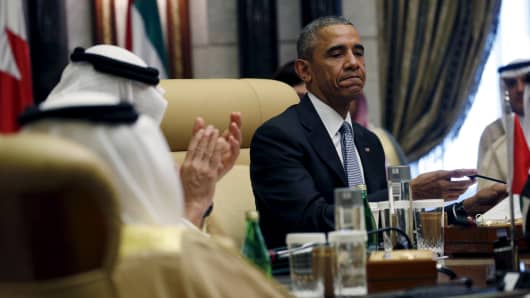Saudi Arabia has threatened to sell up to $750 billion in U.S. assets if a bill passes Congress that would allow sovereign governments to be held responsible for any role in the Sept. 11 attacks, according to the New York Times.
The well-discussed issue here is not just the bill, but also the potential release of 28 pages of redacted material that was never included in the 9/11 Commission Report.
Neither the Saudi government nor any of its senior officials have ever been implicated by the 9/11 Commission in those attacks, but some of the terrorists involved were from Saudi Arabia. There has been some speculation that those pages could show less senior officials or parts of the Saudi government may have played a role.
While the White House is reportedly planning to veto the bill, if passed, it takes a certain kind of ally to threaten to dump U.S. assets if they are held responsible for something they may have had a hand in.
Michael Hiltzik, a columnist at the Los Angeles Times, suggests that the Saudi threat to dump assets, particularly Treasury bonds, is an empty one, given that the kingdom may not own anywhere near that amount of Treasurys in the first place, let alone other assets that would be easily sold.
The U.S. should not quake in its boots over Saudi threats. First, the Saudis, despite their recent success in re-taking control of the oil market, remain pressured by rising competition from U.S. energy producers.
It's true that the kingdom's strategy to flood the market with oil has forced American frackers to cut production. Total U.S. oil output is now estimated to be just below 9 million barrels per day, down from a peak of 9.7 million barrels last April, although this reduction may well prove temporary.
With oil prices now just a few dollars away from $50 a barrel, frackers could bring production back online, since their operations could prove profitable again at recently inflated prices.
However, from a foreign-policy standpoint, I would argue that the U.S. should issue a few threats of its own.
As President Obama visits the Saudis and other Gulf State leaders this week, he should suggest that any further threats by Riyadh will be met with a forceful response.
He could promise to begin selling oil from the U.S. Strategic Petroleum Reserve (SPR), which is filled to the brim. One could argue the SPR is no longer needed, given the U.S. has more than enough easily accessible oil in the ground to be pumped in the event of a global supply shock.
A wholesale dumping of crude from the SPR would drive oil prices back down and adversely affect Saudi finances.
The Saudis just borrowed $10 billion on the world bond market to help cover budget deficits incurred as oil prices plunged to $26 per barrel earlier in the year.
In addition, the U.S. government should contract with the fracking community at profitable prices to re-start energy production in once-booming communities that have fallen on hard times, until U.S. production equals that of Saudi Arabia.
That could be accomplished reasonably quickly given the number of drilled but untapped wells in the oil patch. That would send a rather potent message as to who now is the boss in world oil markets.
The president should also suggest that the Saudis might want to find their advanced weaponry elsewhere, since it increasingly has shown itself to be an ally in name only.
The U.S., at long last, has the energy capacity to be the single biggest player in the world oil market. It's time Washington plays the cards it's been dealt. For the first time in over 40 years, that's a winning hand.
Commentary by Ron Insana, a CNBC and MSNBC contributor and the author of four books on Wall Street. Follow him on Twitter @rinsana.
For more insight from CNBC contributors, follow
@CNBCopinion
on Twitter.







